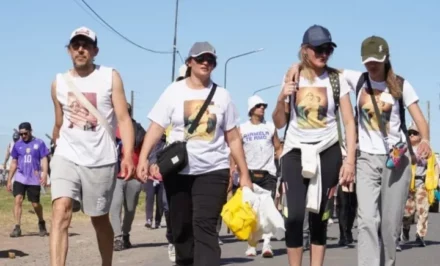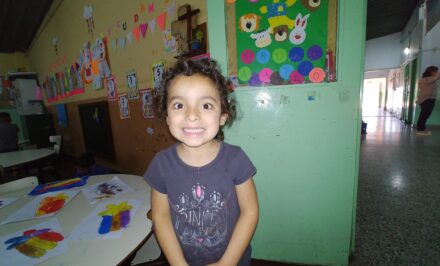 org. Every part of the Church, and many others outside of her – believers or non-believers – have received Pope Francis` clear and hope-filled words. They are also words that motivate us to assume the responsibility we all have to build a world in accordance to the Will of God, in the strength of the Spirit and through the way of Christ. Cardinals and bishops, priests, men and women religious, novices and seminarians, families, the youth and elderly, communities and institutes have received this challenge to go out “onto the street” to take – not a utopian hope – but concrete deeds in living evangelization projects to all men and women wherever they may be. And if they are on the “outskirts” then we have to go there, with all the risks and dangers it may include. He repeats to us constantly: I prefer an injured church, because she goes out to serve, to a Church that is sick because of her self-absorption. Testimony to this can be found in the section of Schoenstatt.org where on a weekly basis texts are selected which motivate us on our own pilgrimage toward the 2014 Jubilee. Undoubtedly, because we are the Church, these words are also directed to us. How happy must our Father not be with this missionary impetus which is given to us from the very heart of the Church! (Fr. José María García)
org. Every part of the Church, and many others outside of her – believers or non-believers – have received Pope Francis` clear and hope-filled words. They are also words that motivate us to assume the responsibility we all have to build a world in accordance to the Will of God, in the strength of the Spirit and through the way of Christ. Cardinals and bishops, priests, men and women religious, novices and seminarians, families, the youth and elderly, communities and institutes have received this challenge to go out “onto the street” to take – not a utopian hope – but concrete deeds in living evangelization projects to all men and women wherever they may be. And if they are on the “outskirts” then we have to go there, with all the risks and dangers it may include. He repeats to us constantly: I prefer an injured church, because she goes out to serve, to a Church that is sick because of her self-absorption. Testimony to this can be found in the section of Schoenstatt.org where on a weekly basis texts are selected which motivate us on our own pilgrimage toward the 2014 Jubilee. Undoubtedly, because we are the Church, these words are also directed to us. How happy must our Father not be with this missionary impetus which is given to us from the very heart of the Church! (Fr. José María García)
![]()
WEEK 13/2014
“Jesus is never far from us sinners. He wants to pour out on us, without limit, all of his mercy.”
Tweet from 24.3.2014

This is the drama of following the commandments without faith: ‘I alone save myself, because I go to the synagogue on the Sabbath, I obey the commandments, but don’t come tell me that that leper or that widow was better than me!’ They were marginalized! And Jesus tells us: ‘But look, if you don’t marginalize yourself, if you don’t feel that you are on the margins, you will not be saved.’ This is humility, the path of humility: to feel so marginalized that we need the Lord’s salvation. Only he can save, not our observance of the precepts. And they did not like this, they became enraged and wanted to kill him.
Santa Marta 24.03.2014
In her canticle, Mary does not say she is rejoicing because the Lord looked at her virginity, her goodness, her sweet nature and her many virtues. No. But because the Lord looked at the humility of his handmaid, her littleness, her humility. This is what the Lord sees. We should also learn this wisdom of marginalizing ourselves, so that the Lord can find us. He will not find us at the centre of our security. No. No. The Lord does not go there. He will find us on the margins, in our sins, our mistakes, our need to be healed spiritually, to be saved; that is where the Lord will find us. This is the path of humility: Christian humility is not the virtue of saying: ‘But, I am worthless’ as a way to hide our pride. No. No. Christian humility is to tell the truth: ‘I am a sinner, I am a sinner.’ Tell the truth: this is our truth. But there is another [truth]: God saves us. But he saves us there, when we are at the margins, he does not save us in our security. Let us ask for the grace of this wisdom of marginalizing ourselves, the grace of humility to receive the Lord’s salvation.”
Santa Marta, 24.3.2014
Mary offered her very existence, she made herself entirely available for God’s will, transforming herself into the “place” of his presence, into the “place” where the Son of God lives. The experience of fraternal sharing with those who suffer opens us to the true beauty of human life, including its fragility. In safeguarding and promoting life, regardless of the state or condition in which it is found, we can recognize the dignity and the value of each human being, from conception to death.
Pontifical Council for Health Care Workers, 24.3.2014
That day she met Jesus, he was sitting and “tired out by the journey” (John 4.6). Immediately he said to her, “give me a drink” (v 7). In this way, he overcame the barriers of hostility that existed between Jews and Samaritans and broke down the prejudices about women. Jesus’ simple request is the start of a sincere dialogue, through which He very sensitively enters the interior world of a person who, according to the social structures [of the time], should not even have spoken to him. But Jesus does this, yes? Jesus is not afraid. When Jesus sees a person, he goes further because he loves, he loves us all and does not pass someone by because of prejudice. Jesus has the Samaritan woman confront her reality, not judging her, but making her feel respected, recognized and elicits a desire to arise within her to go beyond her daily routine.
Jesus’ thirst was not so much for water but to meet a thirsty soul. Jesus needed to meet the Samaritan woman to open her heart: he asks her for a drink to show her the thirst within herself. The woman is touched by this encounter: she asks Jesus those deep questions we all have inside us, but often ignore.
Angelus, 23.3.2014
The Lord is greater than prejudices, this is why he is not afraid to be there with the Samaritan woman: mercy is greater than prejudice. Mercy is greater than prejudice, this is something we have to learn well, no? Mercy is greater than prejudice and Jesus is so merciful, so merciful. The outcome of the encounter at the well was the woman’s transformation: “she left her water jar” (v 28) and ran into town to tell of her extraordinary experience. I found a man who told me all the things I have done, perhaps he is the Messiah. She was excited! She had gone to fetch water at the well and she found another kind of water, the living water of mercy that gives eternal life. She found the water that she had always searched for! She ran to the people, the same people who judged her and rejected her, and announced that she had met the Messiah: the one who changed her life. Because each encounter with Jesus changes our life, one step at a time, one step closer to God. And thus, every encounter with Jesus changes our lives. Always, yes? It is always like this!
Angelus, 23.3.2014
In this gospel, we also find the incentive to “leave our water jar,” the symbol for everything that seems important, but which loses its value in the face of “God’s love.” We all have one, we all have one, or more than one, yes? I ask you, myself as well: what is your interior water jar, which weighs you down, distances you from God? Let us set it aside for a while and feel Jesus’s voice within our heart, offering us another kind of water, another kind of water that draws us closer to the Lord.
We are called to rediscover the importance and the meaning of our Christian life, which began at baptism, and like the Samaritan woman, we need to give our brothers witness to the joy of the encounter with Jesus; give witness to the joy of the encounter.
Each encounter with Jesus changes our lives. Each encounter with Jesus also fills us with joy, that interior joy that comes to us. And then the Lord does these marvellous things. The Lord knows how to act in our hearts when we are courageous and set our water jars aside.
Angelus, 23.3.2014
That is the drama of these people, and also our drama! They made themselves masters of God’s Word. And God’s Word became their word, a word that furthered their interests, their ideologies, their theologies…but at their service. And everyone interprets it as they please, according to their own interests. That is the drama of these people. And to preserve this, they killed. This happened to Jesus.
The chief priests and the Pharisees knew that he was speaking about them when they heard Jesus say this. They tried to capture it and kill it. Yet in this way, the Word of God dies, becomes a prisoner, the Holy Spirit is imprisoned by each of their desires. And this is exactly what happens to us when we are not open to the newness of God’s Word, when we are not obedient to God’s Word. But there is one sentence that gives us hope. The Word of God is dead in the hearts of these people: it can also die in our heart. But it does not end there, because it is alive in the hearts of simple people, humble people, the people of God. They tried to capture him but they were afraid of the masses of the people of God, because they saw him as a prophet. These simple masses – who followed Jesus because what Jesus told them was good for the heart, warmed the heart – these people were not mistaken: they did not use God’s Word to serve their own interests. They felt and tried to be a little better.
And what about us, what can we do not to kill God’s Word, to be obedient, to not imprison the Holy Spirit? Two simple things: this is the attitude of whoever wants to hear God’s Word: first, humility; secondly, prayer. These people did not pray. They didn’t need to pray. They felt secure, they felt strong, they felt that they were ‘gods.’ Humility and prayer: with humility and prayer we move ahead to hear the Word of God and obey it. In the Church. Humility and prayer in the Church. In this way, what happened to those people will not happen to us: we will not kill to defend the Word of God, a word which we believe is the Word of God, but is really a word which we have completely altered.
Santa Marta, 21.3.2014
See all texts in “Francis for the Pilgrims 2014”
Message for World Youth Day 2014
![]()
The aim of the pilgrimage
is the renewal of the covenant of love
as a missionary and unifying creative force,
i.e. internally the renewal of the Schoenstatt Family
and externally the shaping of covenant culture.













